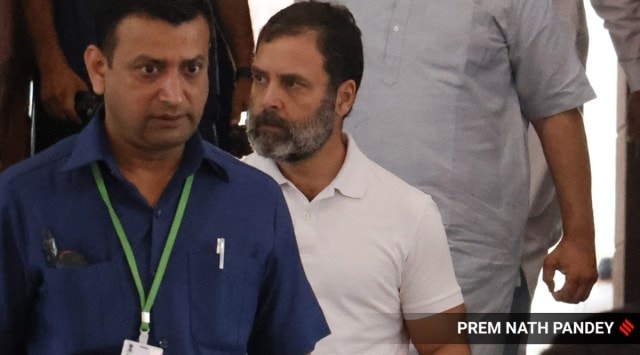Rahul Gandhi disqualification: Former Union Law Minister bats for the UPA ordinance Congress leader opposed
Ashwani Kumar says, “The Ordinance sought to be introduced by the UPA government was intended to introduce a provision for appeal to address the harsh operation of the law … oppressive and disproportionate punishment is counter-productive and does not serve the cause of justice”
 Rahul Gandhi at the Parliament on Friday. (Express Photo)
Rahul Gandhi at the Parliament on Friday. (Express Photo)Former Union Law Minister Ashwani Kumar on Friday said a Surat court’s decision to convict Congress MP Rahul Gandhi in a defamation case raised “a larger question about the harshness and disproportionality of the consequences of a two-year sentence upon conviction” and called for a “review of the existing law”. The Lok Sabha on Friday disqualified Gandhi based on the court verdict.
Kumar, who served in the Manmohan Singh-led Cabinet from October 2012 to May 2013, questioned the law’s provision to take away a legislator’s right to represent people “upon first conviction without even a single appeal to a higher judicial forum”. He said the Congress-led United Progressive Alliance (UPA) government had introduced an ordinance to address the “harsh operation of the law”. A public chastising on Rahul’s part against the ordinance, including the famous incident of him tearing into the ordinance, made the government roll it back.
The former Law Minister said in a statement:
While the legality of the judgment of a Surat court in the defamation case against Rahul Gandhi will be challenged, the decision raises a larger question about the harshness and disproportionality of the consequences of a two-year sentence upon conviction.
A spate of disqualifications of members of state Assemblies and Parliament in the recent past has given reason to consider a review of the existing law to provide reasonable opportunity to the member concerned to question the conviction without incurring disqualification as a legislator.
It is time to consider whether a valuable democratic and statutory right to represent people can be taken away upon first conviction without even a single appeal to a higher judicial forum. The Ordinance sought to be introduced by the UPA Government was intended to introduce a provision for appeal to address the harsh operation of the law.
It is well established that oppressive and disproportionate punishment is counter-productive and does not serve the cause of justice. The majesty of law is best secured by its acceptability in the consciousness of the nation.
A progressive evolution of the law demands a purposive legislative and political response to the experience and application of laws. Hopefully, a political consensus can be achieved on the imperatives for such a law.
- 01
- 02
- 03
- 04
- 05































